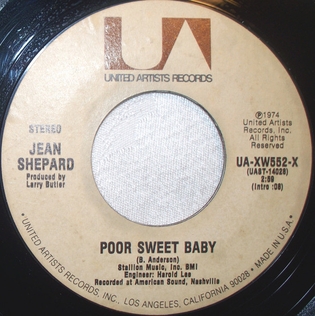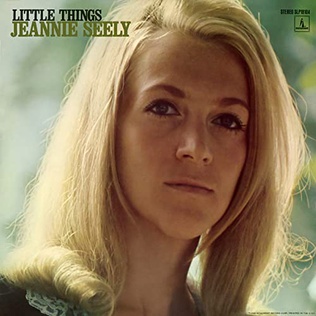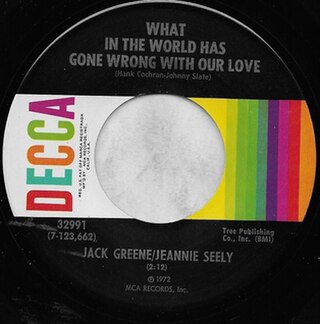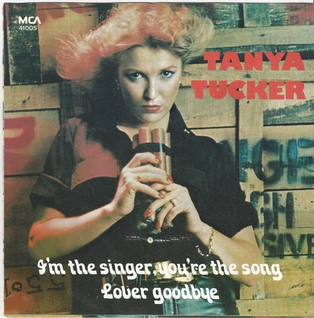Related Research Articles

Marilyn Jeanne Seely is an American singer, songwriter, record producer, actress and author. Most notably identified with the country music genre, Seely found success with the Grammy Award-winning song "Don't Touch Me" (1966). Her soul-inspired vocal delivery gave her the nickname of "Miss Country Soul". Seely is also known for her membership and presence on the Grand Ole Opry, having appeared more times on the program than any other performer.

"Don't Touch Me" is a song written by Hank Cochran. It was originally written for and recorded by American country artist Jeannie Seely. The song was released as a single on Monument Records in March 1966 and became a major Billboard country hit. "Don't Touch Me" became Seely's signature song and her biggest hit as a solo artist. It would later appear on her debut studio album and be re-recorded by Seely in later years.

The discography of American country artist Jeannie Seely contains 17 studio albums, four compilation albums, one soundtrack album, four music videos, ten album appearances and 36 singles. Her first singles were for the Challenge label before 1966's "Don't Touch Me". The latter reached number two on the US Billboard Hot Country Singles chart and her only single to reach the Billboard Hot 100, peaking at number 85. The song was included on her debut studio album titled The Seely Style (1966), which reached number eight on the US Billboard Top Country Albums chart.

The discography of American country artist Jeanne Pruett consists of six studio albums, one live album, three compilation albums and 37 singles. While working for a publishing company, she signed a recording contract with RCA Records in 1963. She released several singles that did not become successful. In 1969, she signed with Decca Records. Her first charting single was 1971's "Hold to My Unchanging Love". This was followed by "Love Me", which became a top 40 hit and prompted the release of her debut studio album. In 1973, Pruett released the single "Satin Sheets", which became her biggest hit. The song spent several weeks at number one on the Billboard Hot Country Singles chart and crossed over to number 28 on the Hot 100. Its corresponding album of the same name also topped the Billboard Country Albums chart in July 1973.

"Poor Sweet Baby" is a song written by American singer-songwriter Bill Anderson that was originally recorded by American country singer Jean Shepard. Released as a single by United Artists Records in 1974, it reached the top 20 of the US and Canadian country charts in early 1975. It would serve as the title track to Shepard's 1975 studio album Poor Sweet Baby...And Ten More Bill Anderson Songs.

"It's Only Love" is a song written by Hank Cochran that was originally recorded by American country artist Jeannie Seely. It was released by Monument Records as a single in September 1966, rising to the US country songs top 20. It was given positive reviews from music publications following its release and was included on her debut studio album The Seely Style.

"I'll Love You More (Than You'll Need)" is a song written by Hank Cochran that was originally recorded by American country singer Jeannie Seely. Released in 1968 as a single by Monument Records, it became her third top ten single on the US country chart songs chart. The song also served as the title track to Seely's 1968 studio album I'll Love You More and received a positive response from critics following its release.

The singles discography of American country artist Dottie West contains 59 singles released as a solo artist, 12 singles released as a collaborative artist, 3 promotional singles and 1 other charting song. West signed with RCA Victor Records in 1963, having her first Top 40 hit the same year. It was followed in 1964 by "Love Is No Excuse", a duet with Jim Reeves that became West's first top 10 hit. In 1964, she also released "Here Comes My Baby". The song reached number 10 on the Billboard Hot Country Singles chart and became the first song by a female country artist to win a Grammy award. From her 1966 album, West issued four singles, including the top 10 hits "Would You Hold It Against Me" and "What's Come Over My Baby". Over the next two years she had major hits with "Paper Mansions", "Like a Fool", "Country Girl", and "Reno". In 1969, West collaborated with Don Gibson on "Rings of Gold", which reached number 2 on the Billboard country chart. In 1973, she released a single version of a commercial jingle originally used by The Coca-Cola Company. Entitled "Country Sunshine", the song became West's biggest hit, reaching number 2 on the country songs chart and number 49 on the Billboard Hot 100. The song also nominated her for her eleventh Grammy. After releasing the top 10 hit "Last Time I Saw Him" (1974), West's chart hits declined and she was dropped from RCA in 1976.

Little Things is a studio album by American country artist Jeannie Seely. It was released on December 1968, by Monument Records and was co-produced by Fred Foster and Jim Malloy. The record was Seely's fourth studio album released in her career and included three singles issued prior to the LP: "Welcome Home to Nothing", "How Is He?" and the title track. Little Things placed inside the top 40 on the US country albums chart and received reviews from both Billboard and Cash Box magazines.

"Much Oblige" is a song written by G. Deaton, R. Fulford and G. Simmons. It was recorded as a duet by American country music artists Jack Greene and Jeannie Seely. Released as a single in November 1971, it reached the top 20 on the US and Canadian country songs charts. The song received reviews from Billboard and Cash Box magazines following its release. It was later included on their studio album Two for the Show.

"What in the World Has Gone Wrong with Our Love" is a song written by Hank Cochran and Johnny Slate. It was recorded as a duet by American country music artists Jack Greene and Jeannie Seely. It was released as a single by Decca Records in 1972, rising into the top 20 on both the US and Canadian country songs charts. It was the third and final single to make a chart appearance by the duo.

Can I Sleep in Your Arms/Lucky Ladies is a studio album by American country music artist Jeannie Seely. It was released on November 19, 1973, by MCA Records and was produced by Walter Haynes. It was Seely's first solo studio album in three years and was her first to be issue with the MCA label. The album produced a total of six singles that were originally released between 1970 and 1973. The record is named for its two major hits: "Can I Sleep in Your Arms" and "Lucky Ladies". It would be Seely's final album for the MCA label.

Bill is a studio album by American country singer-songwriter Bill Anderson. It was released in July 1973 on MCA Records and was produced by Owen Bradley. It was Anderson's first studio album to be released on the MCA label after Decca Records merged with the label. It was also his twenty first studio recording to be released and only album project to be issued in 1973. The album included three singles, two of which became number one hits in either the United States and Canada. The album itself also would reach peak positions on national publication charts.
"Spring" is a song written by John Tipton, recorded by American country music artist, Tanya Tucker. It was released in May 1975 and reached the top 20 of the American and Canadian country songs charts. It was among Tucker's final singles released by the Columbia label. It was the first single from her compilation album You Are Beautiful.
"Dancing the Night Away" is a song written by James H. Brown Jr. and Russell Smith, and recorded by American country music artist Tanya Tucker. It was released in August 1977 and became a top 20 single on both the American and Canadian country song charts in 1977. The song was the third single from Tucker's album Ridin' Rainbows.

"I'm the Singer, You're the Song" is a song by American country music artist Tanya Tucker. It was co-written by Tucker, along with Jerry Goldstein. It was released in March 1979 and became a top 20 single on the American country songs chart and a top ten single on the Canadian country songs chart. It was the second single from Tucker's album TNT.
"Love Knows We Tried" is a song written by Rory Bourke, Kerry Chater and Jan Crutchfield, and recorded by American country music artist, Tanya Tucker. It released in April 1981 as the third single from the album Dreamlovers. The song reached the top forty of the North American country music charts.

Country Girl is a studio album by American singer Jody Miller. It was released in February 1975 via Epic Records and contained ten tracks of material. It was the eleventh studio album of Miller's career and was an album of country recordings. Among the recordings were two singles that reached the American country songs chart: the title track and "The Best in Me". Country Girl was met with favorable reviews from critics.
"Welcome Home to Nothing" is a song written by Hank Cochran that was originally recorded by American country artist Jeannie Seely. Released as a single by Monument Records, it reached the top 40 of the US country songs chart in 1968. It was given a positive review from Cash Box magazine following its release and was included on her studio album Little Things.
"I Miss You" is a song written by Hank Cochran and Cliff Cochran that was recorded by American country artist Jeannie Seely. Released as a single, it reached the top 40 of the US country songs chart in 1974. It was among her final top 40 country chart entries and received reviews from both Billboard and Record World magazines.
References
- 1 2 3 "Billboard's Top Single Picks: Country". Billboard . September 7, 1974. p. 50. Retrieved 25 July 2024.
- ↑ Erlewine, Stephen Thomas. "Jeannie Seely Biography". AllMusic . Retrieved 24 July 2024.
- 1 2 Seely, Jeannie (September 1974). ""He Can Be Mine"/"So Was He" (7" vinyl single)". MCA Records . MCA-40287.
- ↑ "Cashbox country reviews: singles" (PDF). Cashbox . August 31, 1974. p. 39. Retrieved 25 July 2024.
- ↑ Whitburn, Joel (2004). The Billboard Book Of Top 40 Country Hits: 1944-2006, Second edition. Record Research.
- 1 2 "Search results for "Jeannie Seely" under Country Singles". RPM . Archived from the original on 2 April 2015. Retrieved 24 April 2012.
- ↑ "Jeannie Seely Chart History (Hot Country Songs)". Billboard. Retrieved July 25, 2024.